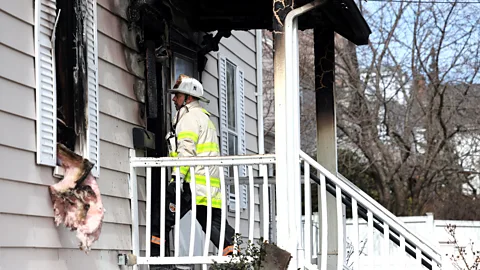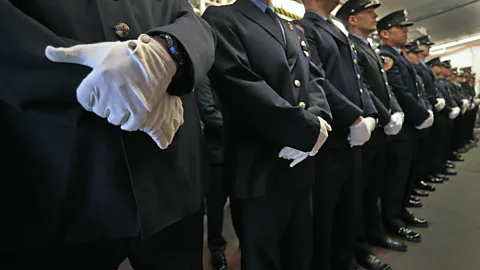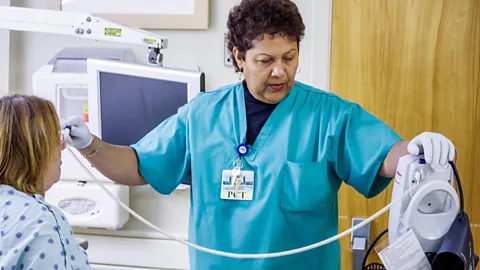The hero tax: Why 'selfless' workers are professionally exploited
 Getty Images
Getty ImagesThe "heroisation" of certain professions has ironic effects on their workers' earning potential.
Few people would deny that some professions command a certain reverence. Veterans, firefighters, health workers and teachers ensure our security, save our lives and nurture future generations. It's little wonder that we label them as "heroes" – a word that evokes the strength and selflessness that seem evident in the day-to-day responsibilities of these jobs.
The warmth of these sentiments may be appreciated, but recent research suggests that the hero label is also loaded with unhelpful assumptions about these workers' personal needs and ambitions. People largely assume, for instance, that heroes simply don't care so much about things like fair compensation for the work that they do. "This is a clear fallacy in inferential reasoning and logic," explains Matthew Stanley, a post-doctoral research associate at Fuqua School of Business at Duke University, US.
The consequences in the workplace can be serious. Stanley's research suggests that "heroisation" may lead to poorer remuneration, and it can lead others to turn a blind eye to policies that result in worse working conditions. "We're less concerned about poor treatment," says Stanley, "if the people who are being exploited are 'heroes'."
Double-edged swords
Stanley was inspired by the experiences of healthcare workers during the early stages of the Covid-19 pandemic. Many people in his social circle – including his wife – were struggling under the workload, and felt that they were not given the support they needed. "Politicians would trot out the 'hero label' as praise and appreciation, but it felt pretty empty," he says.
As a psychologist, Stanley began to wonder whether the very idea of the selfless hero might contribute to their needs being overlooked. If so, this would influence the conditions in many professions besides medicine. Working with Aaron C Kay, a professor at the Fuqua School of Business, he has since designed a series of studies to probe people's assumptions about "heroic" professions. The result is a couple of highly intriguing papers, the first of which was published in the Journal of Personality and Social Psychology last year.
 Getty Images
Getty ImagesIn their initial two surveys, Stanley and Kay confirmed people consider veterans far more heroic than the average US citizen, and that this was linked to perceptions of selflessness and self-sacrifice.
"People think about them in incredibly positive terms: they want them as friends, coworkers and neighbours," says Stanley. "They're the quintessential heroes group."
The psychologists next examined people's perceptions of the jobs that veterans should seek after leaving the military. In various questionnaires, participants assumed that veterans would find a better fit in roles involving the service of others – such as being fundraiser, paramedic or home-health aide – than in higher-paying positions that are associated with greater self-interest, such as being a private banker or insurance agent.
Stanley and Kay saw very similar responses when participants were asked to consider how well veterans would fit into specific organisations. Sure enough, the research subjects assumed someone from the military would be better suited to a job at Habitat for Humanity – a charity that helps build homes for low-income families – over the multinational investment bank Goldman Sachs. Crucially, the researchers found that reinforcing the hero stereotype increases the size of the effect. When the participants saw a logo saying "hire our heroes" alongside their questionnaires, for example, they were even more likely to endorse charity work for the veterans.
 Getty Images
Getty ImagesSome veterans may genuinely prefer a lower-paying job that involves serving others, of course – but there will be a large variation in people's tastes. Stanley suspects these underlying assumptions could unfairly "nudge" individuals into those professions that fit the selfless stereotype. It is easy to imagine how the hero stereotype might influence the career advice they receive, for instance, or employers' recruitment decisions, so that they have a greater chance of heading into those occupations rather than other industries.
Open to exploitation
Stanley and Kay's second paper looked at the ways that heroisation may encourage exploitation at the workplace across many different fields, such as teaching, nursing, social work and policing.
Participants were first asked to rate whether the typical worker in each profession was a hero, on a scale of one (definitely no) to seven (definitely yes). They then had to judge how likely that person would be to volunteer to work an extra day without any reward. As expected, the participants' responses were correlated. When the participants considered a job to be heroic, they had much higher expectations that the workers would sacrifice their day off for free.
The researchers' final experiments studied the participants' opposition to policies that would harm workers' rights. Would the hero label reduce or increase people's outrage at news of teachers' pay cuts, for example? To find out, the psychologists provided text detailing a policy to cut schools' budgets, and then asked them to declare their attitude on a scale of one (strongly oppose) to seven (strongly support). In some cases, the text was accompanied by a cartoon image of teachers dressed in superhero costumes; in others, they simply saw the plain text.
 Alamy
AlamyYou might expect that the natural respect we hold for heroes would reduce support for the pay cuts – but this was not the case. Thanks, apparently, to the associations with selfless altruism, the participants tended to show less opposition to the policy when they saw the picture of the teachers in the capes. "It's brutally ironic," says Stanley. "Because of our veneration, we're more tolerant of them being treated badly."
Empty words
Stanley's findings chime with the opinons of Nicki Credland, a reader in critical care nursing at the University of Hull, UK. She argues that the hero narrative can undermine the skill and education of her colleagues. "[It suggests] we do our jobs because we have a calling and an innate desire to help people – but that's no more true of nursing than it is of many other professions," she says. "And it has a negative impact when we want to be appropriately renumerated for the skills and expertise that we have."
More like this:
The new paper has also attracted praise from other psychologists. Sapna Cheryan, a professor at the University of Washington in Seattle, says the results fit neatly with the scientific literature on "positive stereotypes". She compares it to the "poor but happy" idea – the notion that people on lower incomes somehow live simpler and happier lives – which can reduce people's concerns about the causes of inequality. "We grant people some positivity and then we undermine them," she says.
Nadav Klein, an assistant professor of organisational behaviour at Insead's campus in Fontainebleau, France, argues that we will need further research to show that heroisation influences real-world behaviour, though he agrees it is possible. Like other biases, it emerges from our tendency to draw inferences from a "skeletal understanding of others", he says. "People can make mistaken assumptions based on tiny titbits of information." Such heuristics are common in human reasoning and decision making – and they can be very difficult to correct.
The most obvious solution may be to discourage the use of the "hero" label – but Stanley doesn't think this would be feasible. It is so widely used to convey respect that it would be difficult to persuade people to stop using it, he says.
Instead, he thinks the answer may lie in cultivating greater awareness of the many different reasons that someone could choose a "heroic" profession – besides the general wish to help others. Someone might join the military for the specific training and education that comes with the job, for example. Stanley's research has found that describing these motives can prevent people from making crude assumptions about their subsequent career choices. "We should teach the public about what it is that these people actually want, so that they rely less on the 'caricatures' and stereotypes," he says.
We are all multifaceted individuals, after all, with many competing needs and ambitions – and recognising this fact need not undermine our respect and admiration for the people who keep us safe, secure and healthy.
--
David Robson is an award-winning science writer and author. His next book is The Laws of Connection: 13 Social Strategies That Will Transform Your Life. It will be published by Canongate (UK) and Pegasus Books (USA & Canada) in June 2024. He is @d_a_robson on X and @davidarobson on Instagram and Threads.
For the best of BBC.com in your inbox every Friday, sign up to The Essential List newsletter for a handpicked selection of features, videos and can't-miss news.
